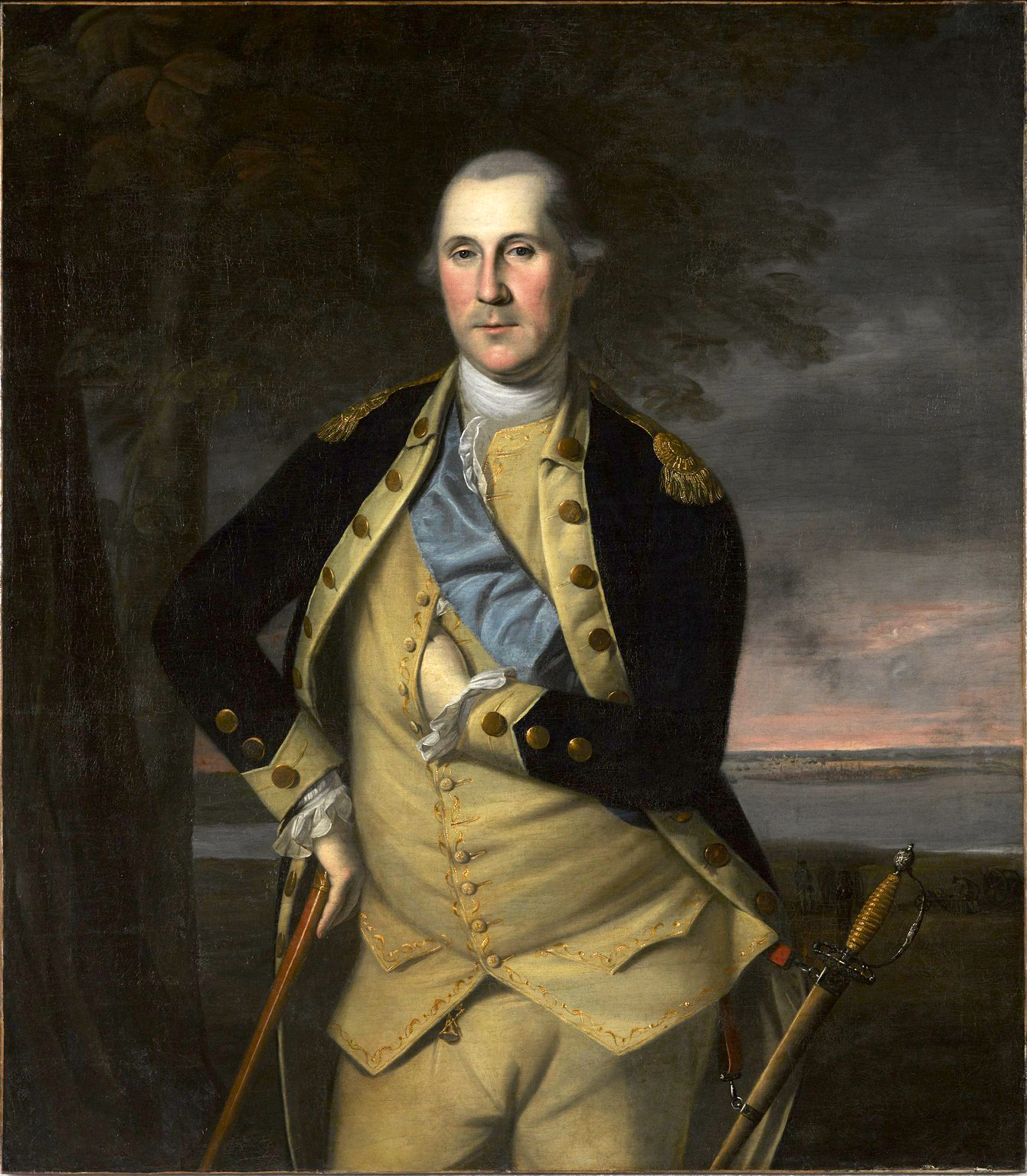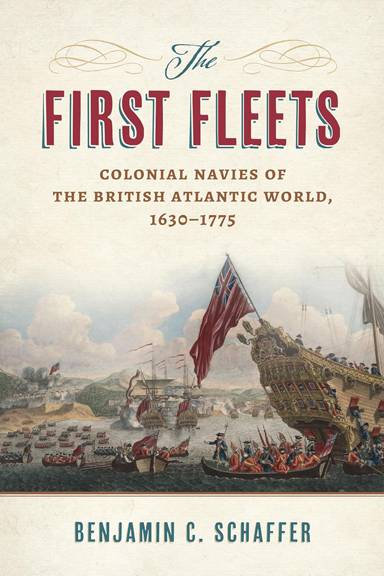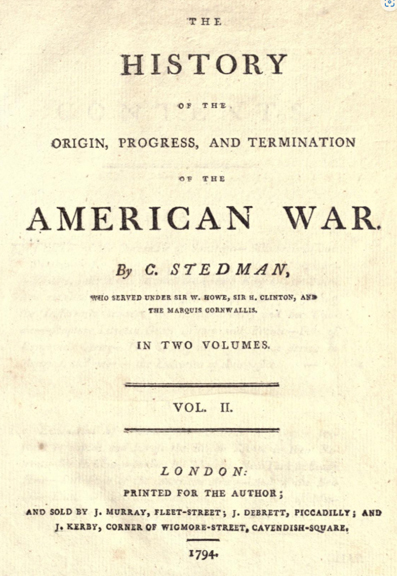“The most unhappy man in the world,” wrote the Commissary General of Purchases at Valley Forge about Gen. George Washington.[1] On every portrait we examine, on every image we see, the commander in chief does appear burdened and preoccupied. Occasionally, though, hidden among the millions of words written by, and about, General Washington, we catch a glimpse of the kindhearted side of the man. Sometimes a rare view of the carefree general emerges, too.
Consider the dreary days of the Valley Forge encampment. Even then, General Washington joined in a game or two of “wicket,” and he undoubtedly enjoyed the competition and exercise.[2] Although Washington looks stern and dour on the dollar bill, he did occasionally share a hearty laugh or two. The commander himself proposed to General Lafayette that the two meet at Mount Vernon after “we shall triumph over all our misfortunes,” as he phrased it, to “laugh at our past difficulties and the folly of others.”[3] And Mrs. Theodorick Bland found him to be charming and “chatty”— even “impudent.”[4]
Martha Bland was well-acquainted with both General and Mrs. Washington. In 1777 she traveled from her plantation in Virginia to visit with her husband, Col. Theodorick Bland, quartered near the Morristown, New Jersey, camp. The vivacious, young Martha Bland revered General Washington, calling him “our noble and agreeable commander” with “excellent skills in military matters.” She went to camp several times a week — “by particular invitation,” she noted with pride to Fanny, her sister-in-law — and took horseback rides throughout the Morristown countryside with General and Mrs. Washington, his aides, and several others. These casual jaunts, it seems, took place between dinner (served mid-afternoon) and dusk. On such relaxed, social occasions, Mrs. Bland found that the commander displayed an “ability, politeness, and attention” that she found charming. Occasionally, too, Martha Bland confided in a May 12, 1777 letter to Fanny, General Washington “throws off the hero, and takes on the chatty, agreeable companion —he can be downright impudent sometimes.”
Washington could also be an enthusiastic dancer, as Catharine (or Caty) Greene, the wife of Gen. Nathanael Greene, discovered at the fourth encampment of the Revolutionary War. In March 1779, the Greenes hosted a “pretty little frisk” at their Middlebrook, New Jersey quarters. That evening, General Greene proudly reported, General Washington whisked the beguiling Mrs. Greene around the dance floor “upwards of three hours without once sitting down.”[5]
Two years later, Caty considered traveling from Rhode Island to South Carolina to visit her husband. Undecided about this arduous endeavor, she consulted General Washington about the propriety of her journey. Then, on October 6, 1781, the commander extended an invitation to Caty through his friend Nathanael Greene: “should she (Caty) persist in … undertaking so long a journey as that from New England to Carolina I hope she will make Mount Vernon … a stage of more than a day or two.”[6] Sometime before December 15, 1781, the intrepid Mrs. Greene arrived at Philadelphia from Rhode Island “in perfect health, and in good spirits, and thinking no difficulties too great not to be surmounted.” To further assist Caty’s travels, Washington assured her husband that he would “endeavor to strew the way over with flowers.” Washington followed up on his promise, subsequently requesting all quartermasters and officers in the Continental service to “give Mrs. Greene every aid and assistance in their power in her journey to the State of South Carolina.”[7] Undoubtedly the commander’s kind letter, which Caty carried with her, did help to smooth her journey.
Washington also acted kindly towards another wife of one of his officers. After Maj. Daniel Neil, an artillery officer, was killed at Princeton, his widow turned to Washington for assistance. Writing to the commander on February 19, 1777, Mrs. Elizabeth Neil lamented that the recent “unhappy situation” had rendered her and her two small children “destitute of support:” they had lost a husband and father, an estate in England, and a farm in New Jersey that was now “rendered useless by the enemy.” Relying on the general’s “known benevolence,” as Elizabeth Neil wrote, she inquired about Congress’s rumored resolutions supporting the widows of fallen soldiers and officers.[8] Washington forwarded the letter to Congress soon after he received it, noting that, although he did not recall any such Congressional provision, he recommended some reparation be made to Mrs. Neil “for her great loss.”[9]
Instead, on March 14, 1777, Congress informed General Washington that no provisions had yet been made to support widows whose husbands has been killed in battle.[10] Replying to Mrs. Neil himself on April 27, 1777, Washington enclosed a copy of the March 14 Congressional resolution, thanked her for sending him a piece of buff cloth, wrote that he could “sincerely feel for your distress,” and included a “small testimony of my inclination to serve you upon any future occasion.” This small testimony was a gift of fifty dollars.[11]
Washington also acted kindly towards his servants. Mrs. Elizabeth Thompson, described as a worthy Irish woman, loyally served as Washington’s housekeeper and cook for five years of the Revolutionary War. She finally left his service at the age of seventy-seven; a letter said that age had “made it necessary for me to retire.” Several years later, in October 1783, Washington received a letter signed “Your Excellency’s Old Devoted Servant, Elizabeth Thompson” that had been written on her behalf. (Mrs. Thompson could not write; her signature was an X.) The letter said that should I “ever want, which I hope will not be the case, I will look up to your Excellency for assistance, where I am sure I will not be disappointed.”[12] Two months later Mrs. Thompson received the sum of $240.00 in full account for services with General Washington’s family during the Revolutionary War.
But the commander did not stop there. It seems that Mrs. Thompson and the general continued to correspond, for a letter written for her to Congress dated two years later, on February 17, 1785, notes that “the General who was always kind to me, and whose countenance was a comfort to me when our affairs were at the worst” had invited her to spend her final days “in his own house” — which was, of course, Mount Vernon. This kind invitation, however, could not be accepted; at eighty-one, Mrs. Thompson was burdened with a “heap of infirmities” that made travel from New York to Virginia impossible.[13]
General Washington made unexpected kindly gestures to others under his command, too. At Valley Forge, after learning that Lt. Col. Leven Powell had been stricken with the debilitating St. Anthony’s fire, he sent Powell three bottles of what the patient considered to be “excellent” wine.[14] On the occasion of the May 6, 1778, celebration of the French Alliance, Washington acquitted a French soldier condemned to death and also “availed himself of the opportunity to pardon all other criminals” in the camp provost.[15] On June 3, 1778, Capt. Allen McLane, also stationed at Valley Forge, received special permission to enter Philadelphia to care for his property after the British left the city. This “indulgence of his Excellency,” however, was to be kept secret, “as it may give room for other applications of a similar nature.”[16] It is no surprise that the soldiers at the encampment thought General Washington to be both “great” and “good” and “the friend and father of us all,” although “the many embarrassments continually thrown in his way have rather made him look older.”[17]
Sometimes Washington also acted kindly towards the enemy. After the battle of Germantown he returned a dog that had wandered away from the British camp. “General Washington’s compliments to General Howe,” began Washington’s October 6, 1777 note. “He [Washington] does himself the pleasure to return him [Howe] a dog, which accidentally fell into his hands, and by the inscription on the collar appears to belong to General Howe.”[18] The commander also obliged Dr. Robert Boyes, a surgeon in the British army. Boyes had sent Washington a “very polite letter” asking for the return of valuable medical manuscripts confiscated by the Americans from the British brig Symetry. “I have no other view in doing this,” the general wrote about returning the manuscripts to Dr. Boyes, “than showing our enemies that we do not war against the Sciences.”[19]
Elias Boudinot wrote from Valley Forge that the “worthy” Washington has “both hands & heart full.”[20] Yet, even during those dark days and throughout the Revolutionary War, the commander occasionally relaxed for a ball game, chatted a little, danced a lot. And, throughout the wartime years, the general’s innate decency showed through in his kind gestures towards the wives of the officers, the soldiers themselves, his servants, and even the enemy.
[1] Ephraim Blaine to William Buchanan, February 18, 1778, in My Last Shift Betwixt Us & Death: The Ephraim Blaine Letterbook 1777-1778, ed. Joseph Lee Boyle (Bowie, MD: Heritage Books, 2001), 131.
[2] The Military Journal of George Ewing: A Soldier of Valley Forge, transcribed by Thomas Ewing, Jr., 47. www.sandcastles.net
[3] George Washington to the Marquis de Lafayette, December 31, 1777, in George Washington Papers at the Library of Congress, 1741-1799, Letterbook 1, 52. Library of Congress (LOC) website. See also James Thacher, M.D., Military Journal of the American Revolution 1775-1783 (Gansevoort, NY: Corner House Historical Publications, 1998), 160. Thacher wrote of Washington that “a loud laugh, it is said, seldom, if ever, escapes him.”
[4] Martha Daingerfield Bland, “Life in Morristown in 1777,” letter to Frances Bland Randolph, May 12, 1777, Proceedings of the New Jersey Historical Society 51:3 (July 1933): 150-53.
[5] Nathanael Greene to Col. Wadsworth, March 19, 1779, in The Papers of General Nathanael Greene, ed. Richard K. Showman (Chapel Hill: University of North Carolina Press) 3:354.
[6] George Washington to Nathanael Greene, October 6, 1781, The George Washington Papers at the Library of Congress, 1741-1799, Letterbook 2, Image 266. LOC website.
[7] George Washington to Nathanael Greene, December 15, 1781, The George Washington Papers at the Library of Congress, 1741-1799, Letterbook 14, Image 327. LOC website.
[8] Elizabeth Neil to George Washington, February 19, 1777, The George Washington Papers at the Library of Congress, 1741-1799, Image 324. LOC website.
[9] George Washington to Continental Congress, February 28, 1777, The George Washington Papers at the Library of Congress, 1741-1799, Letterbook 2, Image 198. LOC website.
[10]Journals of the Continental Congress, A Century of Lawmaking for a New Nation: U.S. Congressional Documents and Debates, 1774-1875. 7: 177. LOC website.
[11] George Washington to Elizabeth Neil, April 27, 1777, The George Washington Papers at the Library of Congress, 1741-1799, Letterbook 1, Image 94. LOC website. .
[12] Elizabeth Thompson to George Washington, October 10, 1783. The George Washington Papers at the Library of Congress, 1741-1799, Image 373. LOC website. .
[13] Elizabeth Thompson to Continental Congress. February 17, 1785. The Papers of the Continental Congress, 1774-1789. National Archives and Record Administration (NARA), microfilm publication M247. Roll 103, Vol 22, item 78, p.297. In this same letter, Mrs. Thompson asked Congress to grant her “little something” to close her eyes in peace; the next day Congress voted to give her $100.00 immediately and $100.00 a year for life, to be paid quarterly. See also A Century of Lawmaking for a New Nation: U.S. Congressional Documents and Debates, 1774-1875. Journals of the Continental Congress, February 18, 1785. 28:85.
[14] Levin Powell to Sarah Powell, January 21, 1778, in Joseph Lee Boyle, Writings from the Valley Forge Encampment of the Continental Army, December 19, 1777-June 19, 1778 (Bowie, MD: Heritage Books, 2000), 1:35.
[15] Johann de Kalb to Madame de Kalb, May 12, 1778, in ibid., 6:134.
[16] James McHenry to Allen McLane, June 3, 1778. The George Washington Papers at the Library of Congress, 1741-1799, Letterbook 5, Images368, 369. LOC website.
[17] Alexander Scammell to Timothy Pickering, February 6, 1778, Writings from the Valley Forge Encampment, 3:62; Samuel Ward to Phebe Ward, April 1778, in ibid., 1:127.
[18] George Washington to William Howe, October 6, 1777, The George Washington Papers at the Library of Congress, 1741-1799, Letterbook 1, Image 85. LOC website.
[19] George Washington to William Smallwood, January 23, 1778. The George Washington Papers at the Library of Congress, 1741-1799, Letterbook 5, Image 7. LOC website.
[20] Elias Boudinot to Hannah Boudinot, April 20, 1778, Writings from the Valley Forge Encampment, 4:110.








4 Comments
Thank you Dr. Loane for an interesting view of the human side of Washington. A comment regarding McLane: His unit’s responsibilities were tactical intelligence collection as well as picket duties. If appropriate procedures were followed, and I have not been able to document this specifically, Washington would have sent him into Philadelphia as the lead unit not only to ascertain full British withdrawal but also to protect his intelligence sources, whom the population might seek to harm based upon their perceived closeness to the previous British authorities. He is reported to have captured several British officers who had dallied too long with their local mistresses as well. So, I assume he took care of his property after his official duties.
I wonder if he would be bemused with a light chuckle or enjoy a full belly-laugh of his image with a full set of choppers?
One might also wonder how Washington, with his modesty about public life and determination to remain a private citizen when his military and political obligations ended, would feel about being depicted on coins and currency.
My guess is that he would have publicly stated that he found the act distasteful to his sensibilities, but privately welcomed the honor.